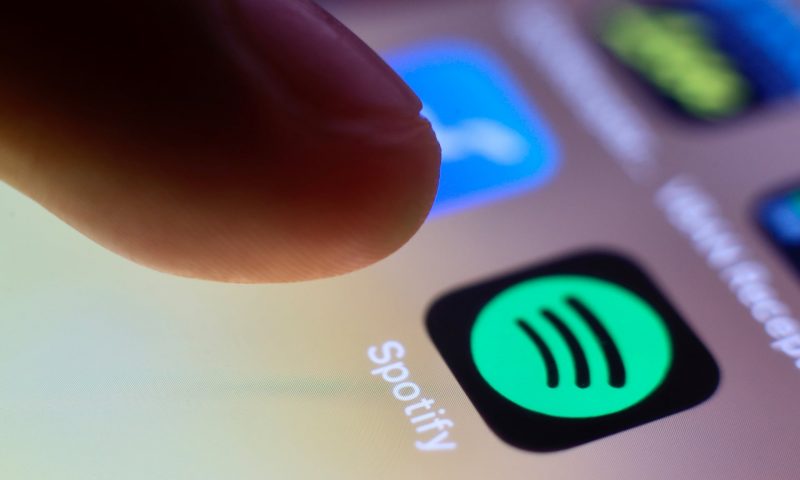Streaming platforms aren’t helping musicians – and things are only getting worse
‘The alarm has been sounding about the lopsided economics of streaming for so long that it has become white noise.’ Photograph: Ritchie B Tongo/EPA
Spotify has announced it’s cutting royalties in exchange for an algorithm boost. It’s the latest in a series of moves damaging an industry already on its knees
When I worked as an artist manager, there was one nerve-wracking question I was asked repeatedly: “Should I tweet this?”
It wasn’t just from unhappy musicians. It came from disillusioned label managers, miffed agents and even the odd publicist, and the subject matter of the Tweet was always the same: a firm critique of streaming platforms and the damage they are doing to the career of musicians and the industry.
It’s a risky public statement to make, given all of the above need streaming platforms to support their music. And after much deliberation, the answer was often, “Don’t tweet.” Don’t bite the hand that feeds you. Now isn’t the time to rock the boat.
But as the pandemic ravages the music industry, and services like Spotify are on an aggressive campaign away from music and towards a broader “audio first” policy (think podcast and other audio streaming services), it seems like now is the time to speak up.
Concerns around streaming economies have been simmering for some time, but it took the pandemic to bring them to the forefront. Previously profitable musicians have been hit hard with an abrupt halt to touring and the associated income. And with little hope of live music as we knew it returning until a vaccine, attention has turned to streaming, with many asking how it got so bad. Is it true that to earn USD$15 per hour a month, you would need to have around 700,000 streams monthly? Do major labels really sign catalogue deals with streaming platforms in secrecy? Are the bulk of user paid subscriptions fees on streaming platforms really going to popular musicians who a user might never listen to? The answer is to all of this is yes.
Just last week Spotify announced it was cutting royalty rates for songs in exchange for an algorithm boost on the platform – a move that quickly provoked the ire of musicians already struggling to see how their streaming income will cover bills. This follows Spotify’s 2020 pivot away from music to radio and podcasts over the last few years, with the USD$100m purchase of podcast studio Gimlet Media, the acquisition of controversial and popular Joe Rogan Show, the USD$235m purchase of podcast ad platform Megaphone and, just last week, the trial of a new breakfast radio show format.
In the meantime, musicians who are still able to gig are pushing themselves to the limits in order to barely break even, and being forced to seek other revenue streams at the same time. It’s easy for an artist like Beyonce to sign lucrative partnerships, but mid-level musicians need direct investment from their fans. This week in Australia, a new platform called Serenade launched, aiming to connect artists with fans who are willing to pay $100-500 for a personal performance. Artists urgently need to find new ways to reconnect with their fans – and the streaming giants are offering little hope.
If you know anyone who runs their own business, they’re likely wondering if they can keep it going through the pandemic. Your favourite musician is probably wondering the same. Without a massive shift from the current model of streaming to a more favourable “user-centric” streaming pay rate, in which a user’s subscription money only goes to the artists streamed by that user, there is little hope that many musicians will be able to carry on without live income. There has been increased use of platforms like Bandcamp, which offer more favourable terms for artists, but without a bigger shift away from Spotify and Apple Music the prognosis is still the same.
The last few months have seen a boom in advocacy groups aiming to empower the music industry or disassemble the current streaming economies, such as the #BrokenRecord and Keep Music Alive campaigns in the UK, the Australian Live Music Business Council and Justice at Spotify in the US. None of this should be a surprise. The alarm has been sounding about the lopsided economics of streaming for so long that it has become white noise. Streaming rates are opaque to say the least, but as some research has pointed out, platforms like Spotify have seen rates dropping year on year – and with more and more artists joining the platform this is only expected to get worse.
If we’re to turn the economics of streaming back in favour of musicians, it will take a lot of noise – a lot of tweets. And it’s a lot to ask of musicians to lead the charge themselves. Recent UK government-led investigations into streaming economies are a promising start – but what can fans do? Perhaps they can find more meaningful ways to support their favourite bands: buying a t-shirt, joining a Patreon, donating while watching a livestream. And maybe they can join a campaign to change the industry – or send out that tweet themselves.
• Evet Jean is an Australian-based music industry consultant, whose management clients have included multiple ARIA-award winning musicians, songwriters and producers.
